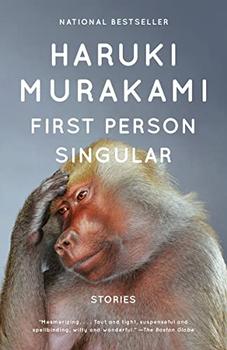Summary | Excerpt | Reviews | Beyond the Book | Read-Alikes | Genres & Themes | Author Bio

This article relates to First Person Singular
 In the short story "With the Beatles" from his collection First Person Singular, Haruki Murakami refers to the writer Ryūnosuke Akutagawa. Akutagawa was born in 1892 in Tokyo's Kyōbashi district. His mother was mentally ill, and his father was unable to take care of him, so he was sent to live with an uncle. Often sickly as a child, he became a voracious reader, a habit that continued into adulthood and laid the foundation for his writing career. At 21, Akutagawa began studying English literature at the Imperial University of Tokyo and founded a literary journal with friends called Shinshichō ("New Thought"). They published translations of foreign writers in addition to their own original work.
In the short story "With the Beatles" from his collection First Person Singular, Haruki Murakami refers to the writer Ryūnosuke Akutagawa. Akutagawa was born in 1892 in Tokyo's Kyōbashi district. His mother was mentally ill, and his father was unable to take care of him, so he was sent to live with an uncle. Often sickly as a child, he became a voracious reader, a habit that continued into adulthood and laid the foundation for his writing career. At 21, Akutagawa began studying English literature at the Imperial University of Tokyo and founded a literary journal with friends called Shinshichō ("New Thought"). They published translations of foreign writers in addition to their own original work.
In 1915, Akutagawa published a story called "Rashōmon" in the literary journal Teikoku Bungaku. The story is set in Kyoto (and named for the city's southern gate) in the 12th century and revolves around two characters who are forced by their impoverished circumstances to engage in morally ambiguous behavior. The following year, Akutagawa published another story, "Hana" ("The Nose"), about a Buddhist priest who is preoccupied by the size of his nose. He went on to publish numerous short stories and poems over the next several years, and also married and had three children. In 1921, he traveled to China for several months on assignment while working as a reporter for an Osaka newspaper, the Mainichi Shinbun. Shortly after his return to Japan, Akutagawa published the story "Yabu no Naka" ("In a Grove"). This story features multiple characters telling their distinct versions of the murder of a samurai, demonstrating the illusory nature of objective truth. (In 1950, director Akira Kurosawa released a film called Rashōmon based on the plots of the Akutagawa story of the same name and "In a Grove" to wide acclaim; the film won an Academy Honorary Award for best foreign-language film in 1952.)
In his late 20s and early 30s, Akutagawa suffered from symptoms of mental illness. Much of his writing from this period is loosely autobiographical, such as "Aru Ahō no Isshō" ("A Fool's Life"), which features 51 short pieces and consists of a narrator ruminating on his misery and contemplating suicide. The story "Haguruma" ("Spinning Gears"), which appears in Murakami's book, is told by a first-person narrator suffering some kind of mental break with reality as he is haunted by hallucinations, including visions of his deceased mother and his doppelganger. Akutagawa declared in an epilogue to this story that it was based on his own journal entries. In 1927 he died by suicide at the age of 35.
One of Japan's most prestigious literary prizes is named for Akutagawa, who is often referred to as the "father of the Japanese short story." First awarded in 1935, the prize recognizes exceptional short fiction by up-and-coming writers. Recent winners include Yu Miri, whose novel Tokyo Ueno Station won the National Book Award for translated fiction in 2020, and Mieko Kawakami, whose acclaimed novel Breasts and Eggs was released in English translation the same year. Kawakami also gained widespread recognition for her 2017 interview with Murakami featuring discussion of his female characters through a feminist lens.
Ryūnosuke Akutagawa before 1922, photographer unknown, via Wikimedia Commons
Filed under Books and Authors
![]() This article relates to First Person Singular.
It first ran in the April 7, 2021
issue of BookBrowse Recommends.
This article relates to First Person Singular.
It first ran in the April 7, 2021
issue of BookBrowse Recommends.
Your guide toexceptional books
BookBrowse seeks out and recommends the best in contemporary fiction and nonfiction—books that not only engage and entertain but also deepen our understanding of ourselves and the world around us.